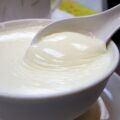Fufu is an essential food in most of West Africa, and it followed enslaved West Africans when they came to the Caribbean. It is often described as having a slightly tart and sour taste. It’s eaten across West Africa, in Nigeria, Ghana, Cameroon, Togo, Benin, Sierra Leone and more, and it pairs well with most stews such as okra soup, tomato stew, egusi and more. It can be made with any of the starchy ground provisions like plantains, cassava, or malanga. In this article we will discuss the health benefits and side effects of eating fufu also known as akpu.
Health Benefits of Fufu
Fufu is a Low Cholesterol Food
Fufu or akpu is very low in cholesterol. High cholesterol can limit blood flow, increasing the risk of a heart attack or stroke. It’s detected by a blood test. In this heart condition, excess LDL cholesterol builds up as plaque in the small arteries of your heart, narrowing and stiffening them. This reduces blood flow, which can make you feel tired or short of breath, as well as cause chest pain.
Fufu is rich in potassium
Fufu is very rich in potassium and it is commonly prescribed by doctors for people who have low level of potassium in their blood. Potassium is one of the most important minerals in the body. It helps regulate fluid balance, muscle contractions and nerve signals. What’s more, a high-potassium diet may help reduce blood pressure and water retention, protect against stroke and prevent osteoporosis and kidney stones.
Fufu is a good source of fiber
Fufu or akpu is a good source of fiber which is very beneficial in improving the digestive system and overall health. Studies also have shown that high-fiber foods may have other heart-health benefits, such as reducing blood pressure and inflammation. Helps control blood sugar levels. In people with diabetes, fiber particularly soluble fiber can slow the absorption of sugar and help improve blood sugar levels.
High in Resistant Starch
Fufu is high in resistant starch, a type of starch that bypasses digestion and has properties similar to soluble fiber. Consuming foods that are high in resistant starch may have several benefits for overall health. First of all, resistant starch feeds the beneficial bacteria in your gut, which may help reduce inflammation and promote digestive health. Resistant starch has also been studied for its ability to contribute to better metabolic health and reduce the risk of obesity and type 2 diabetes. This is due to its potential to improve blood sugar control, in addition to its role in promoting fullness and reducing appetite. The benefits of resistant starch are promising, but it is important to note that many processing methods may lower fufu’s resistant starch credentials.
Excellent Source of Energy
Fufu is a super source of energy. One of the primary functions of carbohydrate food like fufu is to provide your body with energy. Most of the carbohydrates in the foods you eat are digested and broken down into glucose before entering the bloodstream. Complex carbohydrates are an efficient source of energy that fuel muscle contractions. Once eaten, carbs are broken down into smaller sugars (glucose, fructose, and galactose) to be used as energy for immediate tasks. Any unused glucose will be converted into glycogen and stored in the muscles and liver for future.
Good Source of key vitamins and minerals
Fufu made from Cassava is a calorie-rich source of key vitamins and minerals. It contains vitamin C, thiamine, riboflavin, and niacin:
Vitamin C: This vitamin also known as ascorbic acid, is necessary for the growth, development and repair of all body tissues. It’s involved in many body functions, including formation of collagen, absorption of iron, the immune system, wound healing, and the maintenance of cartilage, bones, and teeth.
Thiamine: Thiamine is important in the breakdown of carbohydrates from foods into products needed by the body. It is one of 8 B vitamins. All B vitamins help the body convert food (carbohydrates) into fuel (glucose), which the body uses to produce energy. These B vitamins, often referred to as B-complex vitamins, also help the body metabolize fats and protein.
Riboflavin: Is a vitamin that is needed for growth and overall good health. It helps the body break down carbohydrates, proteins and fats to produce energy, and it allows oxygen to be used by the body. The signs and symptoms of riboflavin deficiency (also known as ariboflavinosis) include skin disorders, hyperemia (excess blood) and edema of the mouth and throat, angular stomatitis (lesions at the corners of the mouth), cheilosis (swollen, cracked lips), hair loss, reproductive problems and sore throat.
Niacin: Like other B vitamins, niacin helps the body break down carbohydrates, fats and proteins into energy, deficiency of this vitamin is a condition that occurs when a person doesn’t get enough or can’t absorb niacin or its amino acid precursor, tryptophan, there have been outbreaks of niacin deficiency in areas of the world where food is scarce.
Side Effects of Fufu
Linamarin toxicity: One of the most common type of fufu is the cassava based fufu. Research has shown that every part of cassava plant has a toxic chemical called Linamarin. This chemical, even after boiling the cassava, doesn’t change its state and this could be harmful during digestion.
Cyanide poisoning: One major risk of fufu consumption is related to the under-processing of fufu, which is rampant and has harmful implications on health. This is because the cyanide content is not reduced to a non-toxic state. Women and children are susceptible to cyanide poisoning as they are usually the ones who carry out the processing of fufu.
Fufu Allergy: Some people have a type of food allergy that make fufu consumption a nightmare for them. Food allergy is an immune system reaction that occurs soon after eating a certain food. Even a tiny amount of the allergy-causing food can trigger signs and symptoms such as digestive problems, hives or swollen airways. SEE: Health Benefits of Semovita







